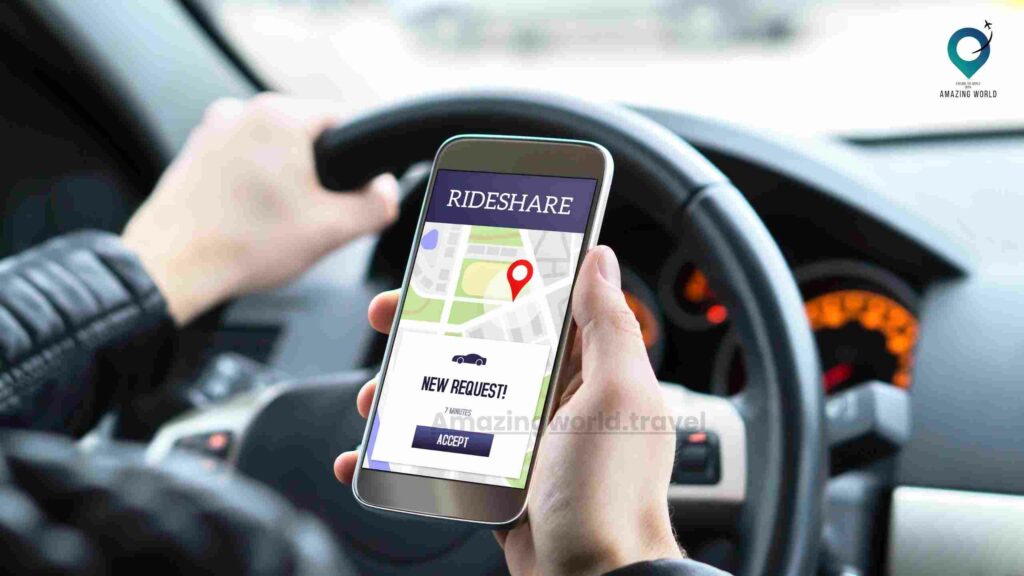Guarding Your Ride: The Truth About Fraud on Ride-Hailing Apps

Are you tired of waiting endlessly for taxis or navigating complicated public transportation schedules? In today’s fast-paced world, convenience is key, and that’s where ride-hailing apps come to the rescue.
These innovative platforms have revolutionized the way we travel, offering a simple and efficient solution for getting from point A to point B. With a few taps on your smartphone, you can summon a ride, whether you’re commuting to work, heading to a night out, or catching a flight at the airport.
In this article, we’ll delve into the world of ride-hailing apps, exploring their popularity, benefits, and how they’ve transformed urban mobility. So, let’s hop on board and discover the ride-hailing revolution that’s changing the way we move around cities.
Looking for the best Car Rental service for your next travel Jouney? Therefore, we recommend you book your car rental from DiscoverCars.com – Official Website
Why are ride-hailing apps so popular?
Ride-hailing apps have gained immense popularity due to their unparalleled convenience. With a simple tap on a smartphone, users can summon a ride to their precise location, eliminating the need to flag down a taxi or wait at a bus stop.
This convenience extends to the ability to schedule rides in advance, track the vehicle’s arrival in real time, and make cashless payments, making the entire experience seamless.
Additionally, ride-hailing services often offer a wide range of vehicle options, from economical to luxurious, catering to diverse passenger preferences.
The accessibility and ease of use have made ride-hailing apps an attractive alternative to traditional transportation methods, revolutionizing the way people move around cities worldwide.
Types of Fraud on Ride-Hailing App

1. Ticket Fraud
Ticket fraud is a prevalent issue that affects Mobility as a Service (MaaS) platforms, where scammers exploit the ticketing system to deceive both passengers and transportation providers. Here’s a detailed look at this type of fraud:
Counterfeit Tickets and Transit Cards:
- Fraudsters create fake digital tickets, QR codes, or transit cards that resemble legitimate ones.
- These counterfeit tickets may be offered at a discount or through unofficial channels, making them appealing to unsuspecting passengers.
Deceptive Sales and Financial Losses:
- Scammers sell these fake tickets to passengers who believe they are purchasing valid transportation passes.
- Passengers who unknowingly use these counterfeit tickets face a double blow: they lose the money spent on the fake tickets and are often denied service by transportation providers.
- Transportation providers also suffer financial losses when they honor counterfeit tickets, as they do not receive payment for the service provided.
Preventing Ticket Fraud:
- MaaS providers can implement robust ticket validation methods, including advanced QR code encryption and real-time authentication.
- Passengers should be educated about purchasing tickets only through official MaaS platforms or authorized sellers.
- Regular audits and checks of ticketing systems can help identify and combat fraudulent activities promptly.
2. Account Takeover
Account takeover is a security threat where malicious individuals attempt to gain unauthorized access to users’ MaaS accounts, compromising personal and financial information. Here’s a comprehensive look at account takeover in the context of Mobility as a Service:
Unauthorized Access Attempts:
- Hackers and scammers employ various methods, such as phishing emails, brute force attacks, or password guessing, to gain access to users’ MaaS accounts.
- Once they have control, they can carry out unauthorized actions, including making bookings, altering user information, or manipulating payment details.
Impact on Users:
- Account takeover can have severe consequences for users. They may find themselves locked out of their accounts or notice unauthorized transactions or bookings.
- Personal information, such as names, contact details, and payment card details, canbe exposed or stolen, leading to potential identity theft and financial losses.
Mitigating Account Takeover:
- MaaS providers must implement robust security measures, such as multi-factor authentication (MFA), to protect user accounts.
- Users should be encouraged to use strong, unique passwords and enable MFA whenever possible.
- Regular monitoring and detection of suspicious activities, including multiple failed login attempts, can help identify and prevent account takeover attempts.
Response to Account Takeover:
- Users who suspect their accounts have been compromised should immediately change their passwords and report the incident to the MaaS provider.
- MaaS providers should have a well-defined process for handling account takeover cases, including notifying affected users and investigating the breach.
3. Payment Card Fraud in Mobility as a Service (MaaS)
Payment card fraud is a pressing concern in the world of Mobility as a Service (MaaS), just as it is in other digital platforms. Here, we’ll delve into this issue and explore how fraudsters target MaaS platforms:
Similarity to Ride-Hailing Apps:
- MaaS platforms, like ride-hailing apps, require users to enter their payment card information to facilitate bookings and transactions.
- This similarity makes MaaS platforms an attractive target for fraudsters who are experienced in exploiting payment systems.
Stolen Credit Card Information:
- Fraudsters often acquire stolen credit card information through various means, such as data breaches, phishing, or purchasing card data on the dark web.
- Once they have access to this stolen data, they may attempt to use it within the MaaS ecosystem for their own gain.
Types of Payment Card Fraud in MaaS:
- Booking Fraud: Scammers use stolen credit card details to book rides, tickets, or other services within the MaaS platform.
- Account Funding Fraud: Fraudsters may add stolen credit cards to MaaS accounts to fund their own transportation needs or make purchases, often leading to chargebacks and disputes.
Impacts of Payment Card Fraud:
- Financial Losses: Victims of payment card fraud can suffer significant financial losses if unauthorized transactions are not caught and reported in a timely manner.
- Reputation Damage: For MaaS providers, payment card fraud can result in reputational damage, loss of trust among users, and increased costs related to handling disputes and chargebacks.
Preventing Payment Card Fraud:
- Advanced Security Measures: MaaS providers must implement advanced security measures, including encryption of payment card data and compliance with Payment Card Industry Data Security Standard (PCI DSS) requirements.
- Transaction Monitoring: Real-time transaction monitoring can help detect suspicious or unusual payment activity.
- User Education: Users should be educated about the importance of safeguarding their payment card information and encouraged to report any suspicious transactions promptly.
Responding to Payment Card Fraud:
- In case of suspected payment card fraud, users should contact their bank or credit card issuer immediately to report the unauthorized transactions.
- MaaS providers should have mechanisms in place to investigate and address instances of payment card fraud, including refunding affected users and cooperating with law enforcement when necessary.
Payment card fraud is a significant challenge in the MaaS ecosystem, but with robust security measures, vigilant monitoring, and user education, it’s possible to reduce the risks and protect both users and MaaS providers from the financial and reputational harm caused by fraudulent activities.
4. Identity Theft in Mobility as a Service (MaaS)
Identity theft is a serious concern in the context of Mobility as a Service (MaaS), where criminals may attempt to steal the personal information of MaaS users. Here’s a detailed explanation of identity theft in MaaS:
Theft of Personal Information:
- Criminals involved in identity theft seek to obtain sensitive personal information from MaaS users. This information may include names, addresses, Social Security numbers, driver’s license numbers, and more.
- Once they have this data, they can use it for fraudulent purposes.
Opening Accounts in the Victim’s Name:
- One common tactic used by identity thieves is to open accounts or register for services within the MaaS platform in the victim’s name.
- This can lead to unauthorized bookings, use of transportation services, and even the accumulation of debt in the victim’s name.
Financial Losses and Credit Damage:
- Identity theft can result in significant financial losses for victims, including unauthorized charges and payments for services they did not use.
- Perhaps more damaging, identity theft can also harm a person’s credit history and credit score, making it difficult for them to access loans, mortgages, or other financial services in the future.
Impact on Victims:
- Victims of identity theft often face emotional distress and may need to spend considerable time and effort resolving the situation.
- Clearing one’s name and credit history after identity theft can be a lengthy and arduous process.
Preventing Identity Theft:
- Secure Personal Information: MaaS users should take steps to secure their personal information, both offline and online. This includes using strong passwords, not sharing sensitive data unnecessarily, and being cautious about the information they provide on the platform.
- Monitoring Accounts: Regularly monitoring accounts and transaction histories within the MaaS platform can help users spot any unauthorized activity promptly.
- Report Suspicious Activity: Users who suspect identity theft should report it to the MaaS provider and, if necessary, to law enforcement.
Response to Identity Theft:
- Victims of identity theft should take immediate action, such as contacting their bank, credit card issuers, and the MaaS provider to report the incident.
- It’s essential to document all communication related to the identity theft and follow through on the necessary steps to resolve the issue.
Identity theft is a pervasive and damaging form of fraud that can have long-lasting consequences for MaaS users. Vigilance, proactive measures, and prompt reporting of suspicious activity are crucial in preventing and mitigating the effects of identity theft within the MaaS ecosystem.
5. Fake Service Providers in Mobility as a Service (MaaS)
Fake service providers represent a significant threat within the Mobility as a Service (MaaS) ecosystem, where scammers aim to deceive users into booking nonexistent rides or services. Here’s a comprehensive explanation of this type of fraud:
Creation of Bogus MaaS Entities:
- Fraudsters may set up fake MaaS service providers or applications that closely resemble legitimate ones. These fake entities often have convincing logos, names, and branding.
- They may also create fake driver profiles and vehicle listings to appear as part of the service.
Deceptive Booking Process:
- Users looking for transportation services may come across these fake MaaS providers through online advertisements, search engine results, or app stores.
- The booking process on these fake platforms may appear legitimate, with users entering their ride details and payment information as they would on a genuine MaaS app.
Nonexistent or Subpar Services:
- After users book rides or services through these fake providers, they often discover that the promised services do not exist.
- In some cases, users may receive subpar or unsafe transportation options, putting their safety at risk.
Financial Consequences:
- Users who fall victim to fake MaaS providers end up paying for services they never receive, leading to financial losses.
- Scammers may also misuse the payment information provided by users for fraudulent purposes.
Preventing Fake Service Provider Scams:
- Verify the Platform: Users should always download MaaS apps from official app stores or trusted sources.
- Check Credentials: Verify the legitimacy of the service provider by checking for official identification and licensing information.
- Read Reviews: Pay attention to user reviews and ratings on the platform, as fake providers often have few or no reviews.
Reporting Suspected Scams:
- If users suspect that they have booked services with a fake provider, they should report the incident to the MaaS platform and, if necessary, to law enforcement.
- Timely reporting can help prevent other users from falling victim to the same scam.
Fake service providers pose a significant risk to MaaS users’ safety and financial well-being. To protect themselves, users must exercise caution, verify the legitimacy of service providers, and promptly report any suspicious activity. MaaS platforms should also invest in robust verification processes and user education to mitigate the risks associated with fake service provider scams.
6. Phishing Attacks in Mobility as a Service (MaaS)
Phishing attacks represent a serious cybersecurity threat within the Mobility as a Service (MaaS) ecosystem. In these attacks, fraudsters use deceptive emails, messages, or notifications that mimic legitimate MaaS communications to trick users into revealing personal information, login credentials, or financial data. Here’s a detailed explanation of phishing attacks in MaaS:
Deceptive Communications:
- Phishing attacks typically begin with fraudsters sending seemingly authentic emails, SMS messages, or app notifications to MaaS users.
- These communications often mimic official MaaS announcements, ride confirmations, or account alerts, making them appear genuine.
Lure to Fake Websites or Apps:
- The phishing messages often contain links that direct users to fake websites or apps that closely resemble legitimate MaaS platforms.
- These fake sites are designed to trick users into entering sensitive information, such as login credentials, payment card details, or personal information.
Stealing Personal and Financial Information:
- When users unknowingly provide their information on these fake websites or apps, fraudsters capture it for malicious purposes.
- The stolen data can be used for identity theft, fraudulent transactions, or unauthorized access to MaaS accounts.
Variety of Phishing Tactics:
- Phishing attacks can take various forms, including:
- Spear Phishing: Targeted attacks that aim to deceive specific individuals or organizations.
- Clone Phishing: Replicating legitimate messages and modifying them slightly to deceive recipients.
- Vishing: Phishing attacks conducted over the phone.
- Smishing: Phishing attacks sent via SMS.
Protecting Against Phishing Attacks:
- Verify Sender Information: Users should carefully examine the sender’s email address or message source to ensure it matches official MaaS communication channels.
- Avoid Clicking Suspicious Links: Be cautious when clicking on links in messages, especially if the message appears unexpected or requests sensitive information.
- Enable Two-Factor Authentication (2FA): Enabling 2FA on MaaS accounts adds an additional layer of security by requiring a verification code sent to a user’s mobile device.
Reporting Phishing Attempts:
- Users who receive suspicious messages should not interact with them. Instead, report them to the official MaaS provider or relevant authorities.
- Prompt reporting helps MaaS providers take action against phishing campaigns and protect their users.
Phishing attacks can lead to significant financial and privacy risks for MaaS users. To stay safe, users should remain vigilant, verify the authenticity of communications, and avoid clicking on suspicious links or providing sensitive information to unverified sources. MaaS providers should also implement security measures to detect and mitigate phishing threats, protecting their users and brand reputation.
7. Price Manipulation in Mobility as a Service (MaaS)
Price manipulation is a deceptive practice that can impact users within the Mobility as a Service (MaaS) ecosystem. In this context, unscrupulous third-party vendors exploit the system to artificially inflate prices for transportation services, often taking advantage of peak demand or limited availability. Here’s an in-depth explanation of price manipulation in MaaS:
Peak Demand Exploitation:
- Price manipulation often occurs during peak demand periods when there is increased user demand for transportation services, such as during rush hours or special events.
- Fraudulent vendors take advantage of these situations to increase prices significantly.
Artificial Price Inflation:
- Instead of adjusting prices based on legitimate supply and demand factors, fraudulent vendors manipulate the pricing algorithms within the MaaS platform.
- They artificially increase fares or rates to levels that are far above what would be considered reasonable.
Impact on Users:
- Users who book transportation services during these manipulated price spikes may end up paying exorbitant amounts for their rides.
- This can lead to financial hardships, especially for commuters who rely on MaaS for daily transportation needs.
Deceptive Tactics:
- Fraudulent vendors may employ deceptive tactics such as hidden fees, undisclosed surge pricing, or fake surcharge claims to inflate prices further.
- These tactics aim to maximize profits at the expense of unsuspecting users.
Preventing Price Manipulation:
- Transparent Pricing: MaaS providers should strive for transparent pricing models that clearly communicate fare structures and surge pricing policies to users.
- Regulation and Oversight: Government authorities and MaaS platforms can implement regulations and oversight to prevent price manipulation and protect users from unfair pricing practices.
- User Education: Educating users about surge pricing and advising them to check fare estimates before booking can help users make informed decisions.
Reporting Price Manipulation:
- Users who believe they have been victims of price manipulation should report it to the MaaS platform and, if necessary, to relevant consumer protection agencies.
- Timely reporting can lead to investigations and actions against fraudulent vendors.
Price manipulation is a form of fraud that can harm users’ finances and trust in MaaS platforms. By implementing transparent pricing policies, regulations, and educating users about surge pricing, MaaS providers can work to prevent price manipulation and ensure fair and ethical transportation services for all users.
8. Account Reselling in Mobility as a Service (MaaS)
Account reselling is a fraudulent activity that can undermine the integrity of the Mobility as a Service (MaaS) ecosystem. In this practice, individuals attempt to sell MaaS accounts, often with accumulated loyalty points or discounts, on the black market. Here’s a detailed explanation of account reselling in MaaS:
Accumulated Benefits:
- MaaS platforms often offer users various benefits, such as loyalty points, discounts, or rewards, for their continued usage.
- Some users accumulate significant benefits over time, which can include reduced fares or other advantages.
Illegal Account Transfer:
- Fraudsters may seek to exploit these benefits by illegally transferring ownership of MaaS accounts to other individuals.
- This transfer often involves selling the account to a third party, who gains access to the accrued benefits.
Impact on Legitimate Users:
- Legitimate MaaS users may suffer adverse consequences when their accounts are sold to third parties.
- The resale of accounts can result in the loss of accumulated benefits or discounts that were rightfully earned by the original account holder.
Violation of Platform Terms:
- Account reselling is typically in violation of MaaS platform terms of service, which often specify that accounts are non-transferable.
- Users who engage in account reselling risk having their accounts suspended or banned by the platform.
Preventing Account Reselling:
- Strict Account Policies: MaaS platforms can implement and enforce strict policies that prohibit the resale of accounts.
- User Education: Educating users about the risks and consequences of account reselling can discourage this practice.
- Account Security: Encouraging users to use strong, unique passwords and enabling two-factor authentication (2FA) can enhance account security and reduce the risk of unauthorized access.
Reporting Account Reselling:
- Users who come across accounts being sold on the black market or suspect that their accounts have been sold should report the incidents to the MaaS platform.
- Platforms can investigate such reports and take appropriate action against fraudulent account reselling.
Account reselling can compromise the fairness and trustworthiness of the MaaS ecosystem. By implementing strict policies, educating users, and encouraging account security measures, MaaS providers can work to prevent account reselling and maintain the integrity of their platforms for all users.
9. Unauthorized Data Collection in Mobility as a Service (MaaS)
Unauthorized data collection is a privacy concern within the Mobility as a Service (MaaS) ecosystem. MaaS platforms collect valuable user data for legitimate operational and marketing purposes. However, when third parties harvest user data without proper consent, it can lead to significant privacy violations. Here’s a detailed explanation of unauthorized data collection in MaaS:
Collection of User Data:
- MaaS platforms routinely collect user data, which may include information such as location data, travel history, payment details, and contact information.
- This data is typically gathered to improve service quality, optimize routes, and tailor marketing efforts.
Privacy Violations by Third Parties:
- Unauthorized data collection occurs when third parties, often without user knowledge or consent, access and harvest user data from MaaS platforms.
- These third parties may include advertisers, data brokers, or other entities seeking to profit from user information.
Potential Consequences:
- Unauthorized data collection can lead to several privacy-related consequences, including:
- Privacy Breaches: Users may find their personal information exposed to unauthorized entities, risking identity theft or other malicious activities.
- Unwanted Targeted Advertising: Third parties may use harvested data to deliver targeted ads or marketing messages without user consent, leading to an invasion of privacy.
- User Trust Erosion: When users discover that their data has been collected without consent, it can erode their trust in MaaS platforms and the broader digital ecosystem.
Preventing Unauthorized Data Collection:
- Data Encryption: MaaS platforms should employ strong data encryption methods to protect user data from unauthorized access during transmission and storage.
- Privacy Policies: Platforms should have clear and transparent privacy policies that inform users about the type of data collected and how it will be used.
- Consent Mechanisms: Users should have the option to provide or deny consent for data collection and data sharing with third parties.
Data Protection Regulations:
- Complying with data protection regulations such as the General Data Protection Regulation (GDPR) or relevant local laws can help MaaS providers ensure that data is collected and used in a lawful and ethical manner.
- Monitoring and Auditing:
- Regular monitoring and auditing of data collection and sharing practices can help detect and prevent unauthorized data harvesting.
- Reporting Unauthorized Data Collection:
- Users who suspect or discover unauthorized data collection should report it to the MaaS platform and relevant authorities to take appropriate action against the responsible parties.
Protecting user data and privacy is crucial in the MaaS ecosystem. MaaS providers must take measures to secure user data, ensure transparency in data practices, and empower users to control their data. Unauthorized data collection not only violates user privacy but also undermines trust in MaaS platforms and the digital services they offer.
10. Ride-Booking Fraud in Mobility as a Service (MaaS)
Ride-booking fraud is a fraudulent activity that poses a significant risk within the Mobility as a Service (MaaS) ecosystem. In this type of fraud, criminals utilize stolen credit card information or employ other deceptive tactics to book rides within the MaaS platform, ultimately resulting in financial losses for both transportation providers and users. Here’s a comprehensive explanation of ride-booking fraud in MaaS:
Fraudulent Ride Bookings:
- Fraudsters use various means to book rides within the MaaS platform, including:
- Stolen Credit Card Information: Criminals may use stolen credit card details to pay for rides, often without the knowledge or consent of the cardholder.
- Identity Theft: In some cases, fraudsters may use stolen personal information to create fake accounts, enabling them to book rides under false identities.
- Manipulated Payment Information: Some criminals employ tactics to manipulate the payment process, making it appear as if they have paid for the ride while actually evading payment.
Financial Impact on Transportation Providers:
- Transportation providers within the MaaS ecosystem often bear the financial brunt of ride-booking fraud.
- They may end up providing services without receiving payment, leading to revenue losses.
Financial Impact on Users:
- Users who fall victim to ride-booking fraud may face unexpected and unauthorized charges on their payment methods, causing financial distress.
- Some users may also have their accounts suspended or face additional fees for non-payment issues.
Preventing Ride-Booking Fraud:
- Advanced Payment Verification: MaaS platforms can implement advanced payment verification mechanisms to confirm the legitimacy of payment methods used for bookings.
- User Authentication: Robust user authentication processes, such as two-factor authentication (2FA), can help ensure that only authorized users can make bookings.
- Real-time Transaction Monitoring: Implementing real-time monitoring of transactions can help detect and flag suspicious booking activity.
Reporting and Resolution:
- Users who suspect or discover ride-booking fraud should promptly report it to the MaaS platform.
- The platform can investigate the incident and take appropriate actions, including refunding affected users and potentially involving law enforcement in severe cases.
Ride-booking fraud undermines the financial stability of transportation providers and causes financial hardships for users. By implementing strict security measures, real-time monitoring, and effective reporting mechanisms, MaaS platforms can reduce the risks associated with ride-booking fraud and ensure a secure and trustworthy environment for both users and providers.
Protecting Yourself: Tips and Strategies in the Ride-Hailing Environment

Ride-hailing services have revolutionized transportation, but ensuring safety and security remains a top priority. Here are some valuable tips and strategies to protect yourself while using ride-hailing apps.
Verification and Identification
- Verify the Driver’s Identity: Before entering the vehicle, double-check the driver’s identity. Ensure that the photo, name, and license plate displayed in the app match the information provided by the ride-hailing service.
- Use the “Share Trip” Feature: Take advantage of the in-app “Share Trip” feature to share your ride details with someone you trust, such as a friend or family member. This ensures that someone knows your whereabouts during the journey.
- Trust Your Instincts: If something feels off about the driver or the vehicle, trust your instincts. If you have concerns about your safety, cancel the ride immediately and report the issue to the ride-hailing service.
Payment Security
- Use Secure Payment Methods: Opt for secure payment methods like credit cards when booking rides. Credit cards often provide fraud protection, giving you an extra layer of security.
- Monitor Credit Card Statements: Regularly review your credit card statements for any suspicious or unauthorized charges. If you notice anything unusual, report it to your credit card issuer immediately.
- Avoid Sharing Payment Information: Do not share your payment information verbally or through messages with the driver. Payment should always be processed through the ride-hailing app to maintain a secure and traceable transaction.
Reporting Fraud
- Utilize the App’s Reporting Feature: If you suspect fraud, experience any safety concerns, or have a negative experience during a ride, use the ride-hailing app’s reporting feature. This allows you to document and report the incident directly to the service provider.
- Contact Customer Support: Reach out to the ride-hailing company’s customer support for assistance with any issues you encounter. They can provide guidance, investigate complaints, and take appropriate actions.
- Involve Law Enforcement if Necessary: In severe cases, such as instances of physical harm, harassment, or suspected criminal activity, involve law enforcement. They can conduct investigations and take necessary legal action against fraudulent drivers or individuals who pose a threat to your safety.
By following these tips and strategies, you can enhance your safety and security while using ride-hailing services. Remember that being proactive and vigilant is key to ensuring a positive and secure ride-hailing experience.
Conclusion
The world of ride-hailing apps and Mobility as a Service (MaaS) offers convenience and efficiency in transportation, but it’s important to be aware of the potential risks and fraud that can occur within these ecosystems.
We’ve explored various types of fraud that affect MaaS, including ticket fraud, account takeover, payment card fraud, identity theft, fake service providers, phishing attacks, price manipulation, account reselling, unauthorized data collection, and ride-booking fraud.
How much did you like Our Detailed How Fraudsters Take Ride-Hailing Apps for a Ride ? Review Also, please share these Blogs with your friends on social media.
Recommended
- Taxi scams in the USA and Europe
- 10 Common Taxi Scams and How to Avoid Them
- 10 Essential Taxi Safety Tips
- How To Calculate Your Taxi Fare

Meet David Hoper, a passionate travel Blog writer with 7+ years of experience in travel content. Through his exemplary storytelling and engaging narratives, he shares his experiences and brings destinations to life. With a keen eye for detail and a love for exploration, he has cultivated a diverse portfolio of travel blogs that inspire and inform readers worldwide.








